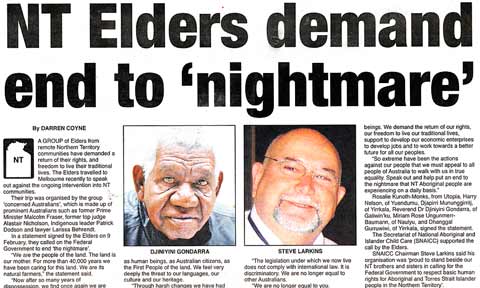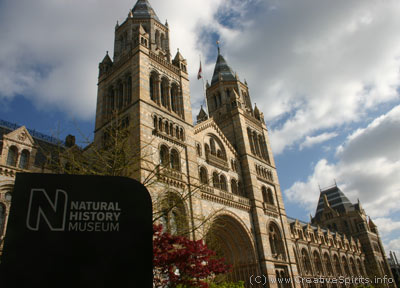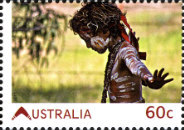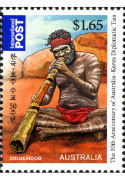History
Timeline results for
Found 1175 results for your search. Showing page 38 of 59.
2011
-
Australia Post becomes the first government business enterprise to create a Reconciliation Action Plan (RAP). It celebrates it with the release of an invitation-only commemorative stamp featuring Ellen Pangerian (1847-1877), also known as Helen Mary Cuper, who was the first Aboriginal post mistress in Australia.
-
Cyclone Yasi crosses over north Queensland causing billions of dollars of damage. Palm Island loses its over 100-year-old Old Fig Tree, a story place of the community. People as far as 700 km away feel the force of the storm which triggers the biggest domestic deployment of the defence forces.
-
Respected elders, a former prime minister and other non-Aboriginal 'elders' sign a statement against the ongoing Northern Territory intervention criticising its "discriminatory" nature and the "failure of democratic processes".
We have had enough! We need our independence to live our lives and plan our futures without the constant oppression and threats which have become central to the relationship between government and Aboriginal communities.
— NT elders in their statement [1]
Elders issue a powerful statement in February 2011, demanding an end to the 'nightmare' of the intervention. "As people in our own land, we are shocked by the failure of democratic processes, of the failure to consult with us and the total disregard for us as human beings," the statement reads. [2] -
The Natural History Museum, London, UK announces to return remains to the Torres Strait which it had bought from a dealer in 1884 but could not date. This return would be the largest repatriation of remains to Australia [3].

Natural History Museum, London. Reluctantly, the museum let go some Aboriginal remains. Many more are stored in its vast halls, believed to have been transferred there for safekeeping from the Royal College of Surgeons while London was being bombed during World War II [4]. -
Yindjibarndi Aboriginal Corporation releases the video FMG’s Great Native Title Swindle showing Fortescue Metals Group head Andrew Forrest addressing a remote Pilbara community meeting. The video shows how powerless and unsupported Aboriginal people are when negotiating with a multibillion-dollar corporation. The video causes big waves in the media.
-
The Lowitja Institute opens in Melbourne, the first national body solely committed to Aboriginal and Torres Strait Islander health research. Its naming patron is Aboriginal woman Dr Lowitja O’Donoghue from the Luritja clan of Central Australia.
-
Benson Saulo from the Wemba Wemba people and raised in Tamworth, is the first Aboriginal person to become Australia’s Youth Representative to the United Nations.
-
Yindjibarndi woman Jodi Broun and Butchulla man Les Malezer become the first elected national Indigenous leaders since the abolition of ATSIC as they assume the positions of co-chairs of the National Congress of Australia’s First Peoples.
-
For the first time, Aboriginal people join on behind the Anzac Day march in Canberra with a banner ‘Lest We Forget the Frontier Wars’.
-
Aboriginal boxer Lionel Rose dies aged 62. He was the first Aboriginal boxer to win a world title. ⇒ Famous Aboriginal sports people
-
The National Sorry Day Committee releases the first progress scorecard of the Stolen Generations Working Partnership.
-
The Australian Capital Territory gets its first Aboriginal politician when Gamilaroi man Chris Bourke is elected to the ACT Legislative Assembly. Mr Bourke is the son of Prof Colin Bourke, the first Aboriginal person to qualify as a dentist.
-
From June to August the government holds 'consultations' in NT communities to get feedback on the intervention.
-
The National Congress of Australia’s First Peoples gets the first elected board, giving Aboriginal people the first elected national representative body since the abolition of ATSIC.
-

To avoid stereotypes, Australia Post could have opted for a more contemporary representation of Aboriginal culture for this stamp. As part of its Living Australian issue Australia Post issues a stamp with the image of a young Aboriginal boy. The photo is titled Little Man's Business and was taken by Suzanne Wilson of New South Wales.
-
The Federal Court of Australia rules that journalist Andrew Bolt has breached the Racial Discrimination Act by challenging the right of people of mixed descent to claim Aboriginal ancestry. He alleges that they fraudulently draw benefits available only to Aboriginal people.
-
In response to the NT intervention, leaders in East Arnhem Land found the Yolngu Nations Assembly (Yolŋu Makarr Dhuni) in Galiwinku to resource practical work toward a treaty for Arnhem Land by facilitating engagement between the Aboriginal Maḏayin form of tribal government and the Westminster forms of governments.
-
Aboriginal directory service inguides.com.au launches Australia’s first Indigenous mobile application.
-
Dr Aunty Ruby Langford Ginibi dies. She was one of Australia’s foremost Aboriginal authors and wrote numerous books, short stories and poetry. Her trademark term was ‘edu-ma-cating’ non-Aboriginal people about Aboriginal peoples’ circumstances and struggle. ⇒ Aboriginal books
-

An identical stamp was issued in Korea to celebrate the relationship with Australia. Australia Post issues a stamp showing an Aboriginal didgeridoo player for the 50th anniversary of the Australian–Korean relationship which was forged during the Korean War. Official diplomatic relations begun in 1961 and developed into a strong partnership. The other stamp shows a Haegeum musician.



